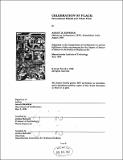Celebration of place : processional rituals and urban form
Author(s)
Kanekar, Aarati K. (Aarati Kumar)
DownloadFull printable version (22.00Mb)
Advisor
Julian Beinart.
Terms of use
Metadata
Show full item recordAbstract
The celebration of processional rituals of festivity is a significant, dynamic, social and temporal dimension of the static form of the built environment. This study endeavors to understand the means by which meaning was added to the form, space and character of the built environment by these processional rituals. Processional rituals influence and are influenced by various aspects of the spatial framework. This study analyzes those spatial aspects that play a significant role in the relationship between processional rituals and urban form in general and then examines how these analytical principles work in the three specific case studies examined in the Indian subcontinent. The first case, that of the South Indian temple cities, focuses on the religious processional rituals; the second, Delhi is important for consideration of political and ceremonial processions; and the third case, Bhaktapur has both the religious as well as the political dimension working together. This thesis shows that processions do have a tremendous impact on urban form and spaces - some of which lose meaning and character without the rituals they were meant to house. Even when the original processional ritual is changes, urban spaces have a determining role in the creation of new rituals.
Description
Thesis (M.S.)--Massachusetts Institute of Technology, Dept. of Architecture, 1992. Includes bibliographical references (leaves 103-108).
Date issued
1992Department
Massachusetts Institute of Technology. Department of ArchitecturePublisher
Massachusetts Institute of Technology
Keywords
Architecture